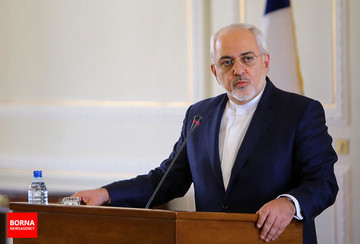The US Treasury Department finally placed the name of the Foreign Minister Zarif in the list of the US sanctions on August 1 after one month of making allegations and machination against the top Iranian diplomat. The Arab media, too, did not ignore the controversial US decision and released news and analysis over the past few days.
Blocking path of diplomacy with Zarif’s sanctions
According to Qatar's Al Jazeera news channel, Zarif’s sanction is blocking diplomacy’s ways of escaping tensions between the United States and Iran. This suggests that the Trump administration is not seeking to change its approach to engagement with Tehran. Analysts believe that the Zarif’s sanction reflects the failure of US policy, which is in conflict with human rights, international law and the issue of freedom of expression and has targeted diplomatic relations and international charters.
The sanction of the head of Iran's diplomatic apparatus shows the White House's double standards. While the Trump administration claims to be willing to negotiate with Iran, it is deceiving and fueling psychological war by sanctioning the head of Iran’s diplomatic apparatus. The United States closed the diplomacy and negotiation windows with Iran by Zarif’s sanction. According to Al Jazeera, Zarif's sanction reflects US anger over his recent trip to New York and his interviews with the US media.
Al-Jazeera TV quoted Iranian affairs researcher Roozbeh Alamdar as saying that Zarif’s remarks in defense of Iran have made the US leaders' patience run out and they have now been forced to restore to bullying in the eyes of the world. He said “Team B’ feels that with Zarif’s sanctions it has inflicted the greatest psychological blow on Iranian decision-makers and has pushed Iran away from rationality. The group is trying to undermine the spirit of rationality and logic in Iran and to confront the country with two options for war or negotiation. Current US policy moves Trump further away from reaching an agreement with Iran, due to the Americans' inability to understand the simplest realities within Iran, which is at the root of the problems.
Lebanon's Al-Akhbar newspaper wrote in a report that in a new move aimed at maximizing pressure, Washington targeted the head of Iran's diplomatic apparatus,. This US decision complicates diplomatic efforts. This decision could unite Iran's political currents more than ever before.
According to Egypt's Al-Youm al-Sabeh newspaper, Zarif's sanction is seen as a move to block the way of diplomacy and negotiation with the United States. Zarif is famous for detente with the West. He and his team succeeded in marathon talks in 2015 and reached a nuclear agreement.
Hani Suleiman, an expert on Iranian issues, points to Zarif’s sanction and this US’ simmering tension is aimed at increasing the scope of pressure on Iran to force Iran to waive its terms of negotiation, wrote Bahrain's al-Watan newspaper.
Al-Quds Al-Arabi quoted Iran Foreign Ministry Spokesman Sayyed Abbas Mousavi as saying the reason for Zarif’s sanction is that Americans fear Zarif’s logic and skill in negotiations. The height of the contradictions and stupidity of American leaders is that they say Zarif has no role in Iranian politics, but at the same time they ultimately sanctioned him.
Increasing popularity of Zarif led to US sanctions
According to “Lebanon 24” website, US action in imposing sanction against Zarif put into question Trump's claim to negotiate a new deal with Iran. The move will move Washington further away from the European countries. The sanctions will increase Zarif’s popularity at home and his immunity from criticism by hardliners. The move reflects the confusion of the Trump administration.
The sanctions will strengthen Zarif’s domestic power and thwart the effects of many of the discourses used against him, the website quoted Ali Fayez an expert as saying in the International Crisis Group.
Saudi media's look at Zarif’s sanctions
Saudi Arabia's Al-Sharq Al-Awsat newspaper, citing Zarif's sanction, claimed that recent developments showed that there was difficulty in finding a common ground for the two sides to negotiate. Although Zarif was a key figure in shaping the nuclear deal, the sanctions imposed on him show that the Trump administration tends to marginalize anyone who, even if symbolically involved, in the nuclear deal.
Al-Sharq Al-Awsat quoted Washington-based researcher Matthew Levitt as saying the sanctions against Zarif was a logical consequence of the US government's view of the Iranian Foreign Ministry's role in a wide range of illegal activities. By doing so, the Trump administration has decided to eliminate legal coverage of the Foreign Ministry's actions in support of terrorism, interference in the elections, and human rights abuses. The US decision showed that there was no difference between hardliners and moderates within the Iranian system.
Saudi Arabia's Mecca newspaper said in a report that sanctions against Zarif indicated that Iran's behavior was unacceptable. Zarif’s sanction has the clear message that the United States is calling on Tehran to change its behavior, especially with regard to its missile and nuclear program. The main reason for the US decision is to increase the financial distress of the Iranian economy and the authorities of the Iranian system to change its behavior.



Your Comment